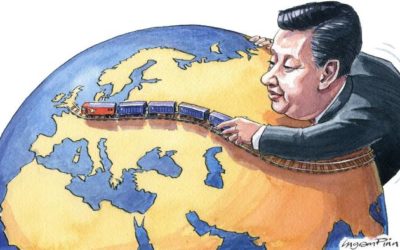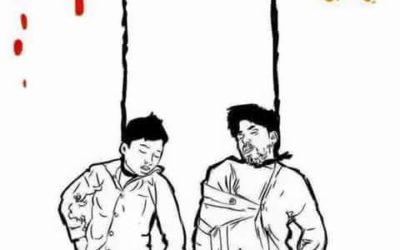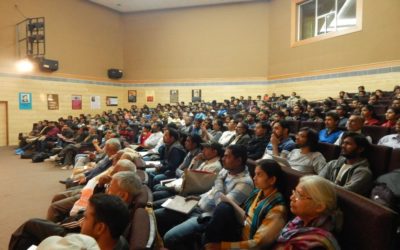Author Archives: Anvil
The Unfolding of the Political Obscenities of Twenty-first Century Fascism
Issue 2, January 2018
 Contents In Lieu of EditorialGujarat and Himachal Elections: What Lies Ahead? Special ArticleNaxalbari and Subsequent Four Decades: A Retrospection (Part – 2)– Deepayan Bose The Post-Marxist Theory of Empire and the Leninist Theory of Imperialism– Shivani Kaul Marx’s Capital : … read more
Contents In Lieu of EditorialGujarat and Himachal Elections: What Lies Ahead? Special ArticleNaxalbari and Subsequent Four Decades: A Retrospection (Part – 2)– Deepayan Bose The Post-Marxist Theory of Empire and the Leninist Theory of Imperialism– Shivani Kaul Marx’s Capital : … read more Lenin : Declaration Of Rights Of The Working And Exploited People

Its fundamental aim being to abolish all exploitation of man by man, to completely eliminate the division of society into classes, to mercilessly crush the resistance of the exploiters, to establish a socialist organisation of society and to achieve the victory of socialism in all countries, read more
China: An Emerging Imperialist Power and the Underlying Implications

Although China cannot directly challenge the US in one on one conflict because China is still much weaker than US in terms of military capacity, yet, recent years have witnessed a clear emergence of a new imperialist axis under the joint leadership of Russia and China in opposition to the US led imperialist axis. The ongoing wars in Middle East especially in Syria are clear indications of the sharpening of these inter-imperialist contradictions. Emergence of multilateral organizations such as Shanghai Cooperation Council and BRICS in itself is sufficient to refute the myth of unipolar world. Meanwhile signs of split in NATO are also becoming clear with the exit of Britain from the European Union and due to Trump’s protectionist policies in US. This opens a possibility that some European countries may also switch the camp. In any case, it is certain that the inter-imperialist conflicts are going to sharpen further in the days to come. Although the chances of a World War seem to be remote in the current circumstances, still regional wars and violent incidents are sure to increase.
read moreTrump’s Jerusalem Move – A sign of desperation of American Imperialism

To understand the implications of and the reasons behind US decision of recognizing Jerusalem as Israel’s capital, it is necessary to understand the rivalry between two imperialist axes — The axis of Arab countries and Israel under the American leadership and Iran-Syria-Hezbollah axis under the Russian leadership. It needs to be noted that US move to intervene in the Syrian civil war to overthrow Bashar Al Assad’s government appears to be backfiring. The Islamic State has turned out to be a Frankenstein that is now hell bent on devouring its own master. The main reason behind US’s strategic failure is the open intervention of Russian imperialism in support of Syria because of which the Assad government appears to be standing on its own feet again.
read moreThe Post-Marxist Theory of Empire and the Leninist Theory of Imperialism

Are we still living in the age of Imperialism or has capitalism entered an altogether new stage? Are the Marxist categories of analysis adequate to comprehend the changes that have occurred in the modus operandi of Imperialism since the times of Lenin? How can the present era of capitalism be characterized as? read more
Gujarat and Himachal Elections: What Lies Ahead?

There is still another section of the liberal “left”, which is still striving to form an aggregative equation of oppressed identities in order to defeat Modi and Fascism. The lacklustre performance of the BJP in the elections was primarily due to the class anger of certain sections of society, even though they were not class ‘politically’ conscious or class ‘politically’ organized. However, people of this section claimed that the anger of the dalits, adivasis, Muslims, OBCs, etc combined to defeat the BJP. read more
Marx’s Capital : 150 Years and Beyond

Marxism is not an aggregation of everything that Marx said or did. Marxism is a worldview, approach and a method. This worldview and method of materialist dialectics is Marx’s epochal contribution to science. As Lenin said, Marx could never write his planned separate treatise on materialist dialectics, but he left us Capital, which is the application of the materialist dialectics in the arena of economic phenomena. read more
Report of Sixth Arvind Memorial Seminar on Imperialism

The Arvind Memorial Trust organizes a national seminar each year on some important aspect of the movement for social change in memory of Com. Arvind Singh, editor of the magazine ‘Dayitvabodh’, a brilliant Marxist intellectual and activist. The first two seminars held in Delhi and Gorakhpur focused on different aspects of the labour movement while the third seminar was held in Lucknow on the democratic rights movement in India. The fourth seminar was centered on Caste Question and Marxism while the fifth seminar in Allahabad was on problems of socialism. read more
